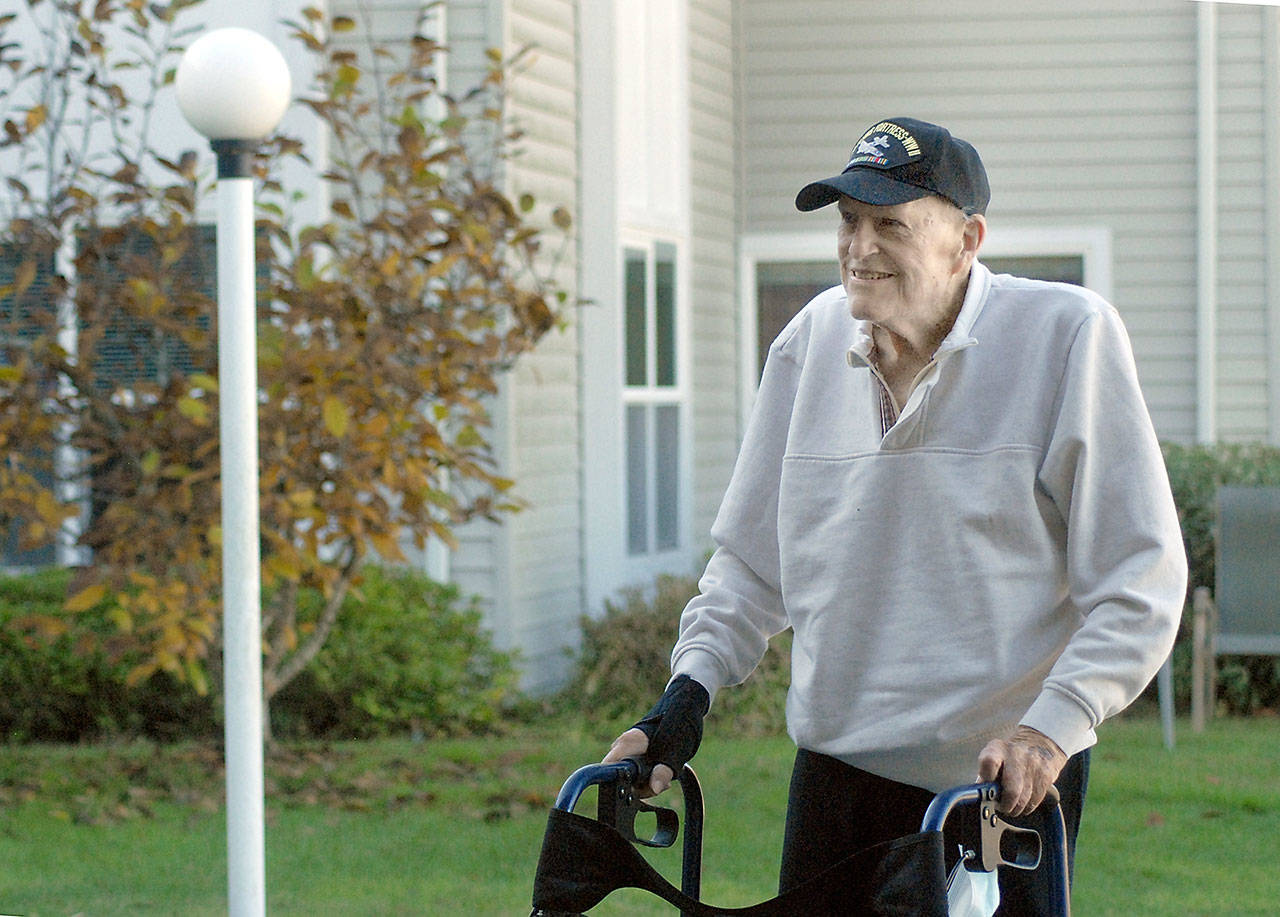PORT ANGELES — Larry Owen kept the Flying Fortress flying during World War II.
The B-17 heavy bomber was “something you could always depend on,” the 97-year-old Port Angeles man said.
Like the aircraft he maintained as a sergeant in the U.S. Army Air Forces’ 463rd Bomb Group, Owen has kept himself in working order 75 years after the war.
“I have no hearing problem. I don’t even wear glasses,” Owen said in a Friday interview.
“I’ve got all my teeth. Losing hair. Outside of that, I guess I’m in pretty good shape.”
Owen is one of about 300,000 surviving World War II veterans, a population that once numbered 16 million, according to the U.S. Department of Veterans Affairs.
“Not many of us left, I guess, for World War II,” Owen said.
Owen was a B-17 crew chief during the war, serving in the Fifteenth Air Forces from January 1943 to November 1945.
The California native worked for a telephone company in the Los Angeles area until he retired and moved to Clallam County with his late wife, Dorothy, in 1976.
Owen was stationed in Southern Italy for much of the war, leading a crew of three that performed maintenance on B-17s that flew bombing missions over the oil fields of Eastern Europe.
“I kept the thing flying,” Owen said.
“Of course, we had specialists,” he added. “We had prop specialists. We had instrument specialists. We did the mechanical end of it.”
Owen displayed a photograph of a B-17 with an off-colored aluminum tail that had been replaced after the original tail was destroyed by enemy fire.
“That’s why it’s a different color,” Owen said during a socially distanced interview at St. Andrew’s Place Assisted Living Community.
“The first ones that came out were all painted, but the later planes that we got were all unpainted. They were natural aluminum.”
The same B-17 lost two of its four engines — No. 1 and No. 3 — on a mission in Northern Italy.
The Tuskegee Airmen, a group of mostly African American P-51 fighter pilots, escorted Owen and one crew member to the site to replace the engines. Owen spent about two weeks with the Tuskegee Airmen.
“Anything that we wanted, they were just right there,” Owen said.
“They were just so accommodating.”
Later in the war, the same B-17 took a direct hit on the nose and crashed in the oil fields near Budapest, Hungary. The bombardier and navigator were killed, but the rest of the crew parachuted out and became prisoners of war.
“I talked to the pilot after the war,” Owen said.
“He said they lost all control. All the controls were shot out, and they couldn’t manage it, so they all had to bail out.”
Owen was born in Bakersfield, Calif., in July 1923. His family moved him to San Gabriel near Los Angeles when he was 4.
“My mother couldn’t stand the heat in Bakersfield,” Owen said.
Owen lived near an airport and developed an interest in aviation at an early age.
After high school, he attended the U.S. Army Air Corps’ six-month aircraft maintenance training program at Curtiss-Wright Technical Institute in Glendale, Calif.
“Then they sent us to Boeing to specialize on the B-17,” Owen said.
Owen discovered the North Olympic Peninsula while studying the B-17 in the Seattle area. He had an uncle named Joe who was a logger in the Port Angeles area in the late 1800s.
“As a kid, that kind of stuck in my mind, and I thought, ‘Where in the hell is Port Angeles?’ ” Owen recalled.
“I really got acquainted with the area when I was in Seattle going to Boeing for their class during the war.”
Owen entered the Fifteenth Air Force in January 1943 when he was 19. He was stationed at MacDill Field in Tampa, Fla., before he was dispatched to Italy.
After the war, Owen worked as a field installer for Pacific Telephone before he moved into the central office as a wire chief.
He met his wife, Dorothy, while working at Pacific Telephone. The couple married in 1954.
“I went out to Palmdale, and she was an operator, and we got acquainted and got married,” Owen said. “I lost her up here in ’98.”
Owen retired from Pacific Telephone in 1976 and moved to the West End of Clallam County, where he owned and operated Three Rivers Resort with his niece and nephew.
The Owens moved to Port Angeles two years later. Larry Owen worked as a purser for nine years on the MV Coho ferry, which has been closed since April due to the COVID-19 pandemic.
Owen said he was “not really” concerned about catching the coronavirus. He has been confined to the assisted living community, which adheres to strict COVID-19 safety protocols and follows health guidelines.
“I do everything that they’ve spelled out,” Owen said.
“That’s the only way we’re going to get rid of it.”
Owen said he stayed physically active in retirement by taking walks on the Port Angeles waterfront, where he and his wife would often stop to drink coffee.
“I used to take my wife, when she was in the wheelchair, down on the waterfront,” he said.
Owen said he stopped attending 463rd Bomb Group conventions about three years ago because of travel difficulties and the dwindling number of World War II veterans.
“I’m about the only one left of the old bunch,” Owen said.
________
Reporter Rob Ollikainen can be reached at rollikainen@peninsuladailynews.com.

